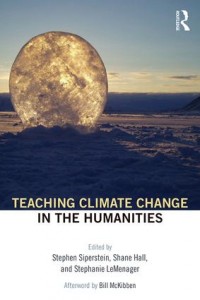Publications and Works in Progress
Teaching Climate Change in the Humanities (Routledge 2017) is edited by Stephen Siperstein, myself, and Stephanie LeMenager. came out of the questions and collaborations of the editors in Stephanie LeMenager’s “Cultures of Climate Change” seminar in 2014 (you can read a bit about this seminar in the New York Times).
“Learning to Imagine the Future: The Value of Affirmative Speculation in Climate Change Education.” Resilience: A Journal of the Environmental Humanities, Vol. 2, No. 2 (Sep. 25, 2015)
“Learning to Imagine the Future” discusses how creative writing in the classroom, particularly utopian writing exercises, can help identify how students understand the present and means of affecting social change. I argue that looking at students’ utopias is not really about inventing the future at all; rather, it is a way in which we can interrogate our present values, assumptions, and knowledge. And I think this is a valuable task in service of answering how we can begin to move past the dead-end imaginaries that trap us within disabling climate denial. While such activities encourage students to confront the difficult task of imagining “the good life” for 7 billion people that does not overtax the earth’s plenty, the activities I describe in this article can help students re-imagine their relation to the present.
Lesson title: Eco-utopia 2075
Time needed: 45–50 minutes in class
Number of students and classroom description: This writing exercise can be implemented in any classroom conducive to student-to-student interaction and individual writing. I have conducted this activity with as few as six students and as many as twenty-six students. The activity could be adapted for large classes and online classes.
Works in Progress:
Hall, Shane. “The Spectacular and Slow Violence of War’s Environmental Racism in The Tattooed Soldier,” (Invited for revision and resubmission at MELUS: Multi Ethnic Literatures of the U.S.)
Hall, Shane. “An Interview with Héctor Tobar,” for Latina/o Environmentalisms: Literary Histories and Critical Theories (under review)
“Militarizing the Environment by Robert Marzac.” Book review for Resilience: A Journal of theEnvironmental Humanities (under review)
